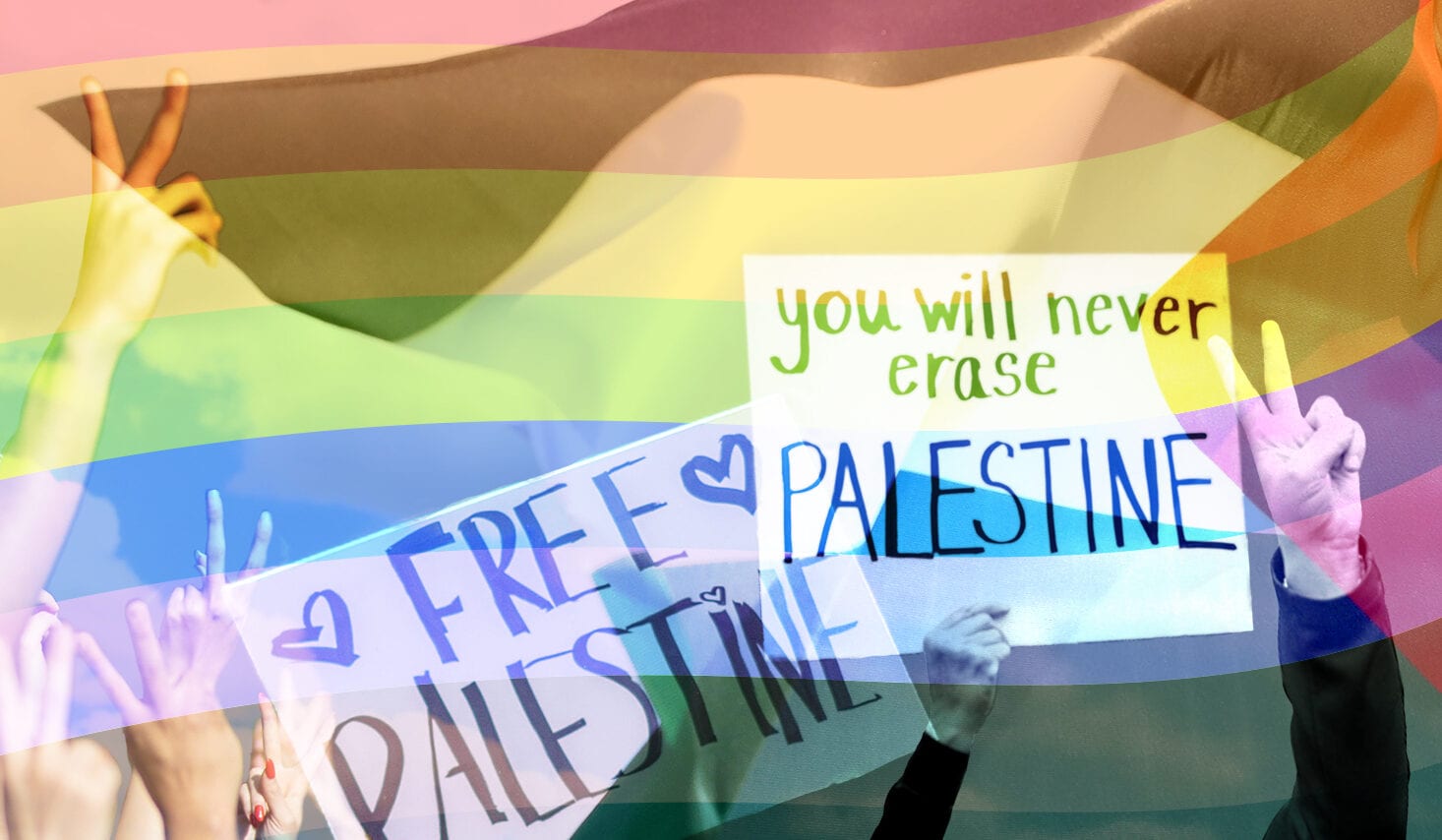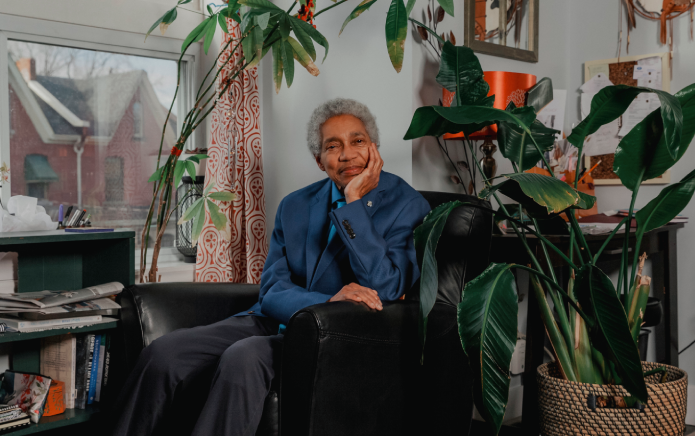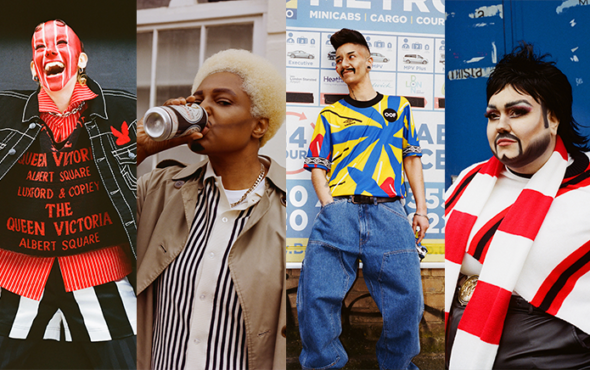
As news of the heightened assault on Palestine hit headlines, communities rallied to show solidarity. Protests, petitions and charity-based donations swept through the UK. Audiences shared harrowing videos spotlighting the growing violence, created informative reactive news threads, and drove the profound asymmetry of power between Israel-Palestine to an intense focus. However, amongst the revitalised movement to address the attacks on Palestine, through the call to #FreePalestine, an air of malaise settled as a strand of discourse shifted from the ongoing “conflict” to the reputation of Palestine’s LGBTQ+ political record. Observations seemingly conflated homophobia with religion and scapegoated LGBTQ+ ethnic minorities often through myopic Twitter quips and TikTok videos. More importantly, these conversations overlooked the existence of LGBTQ+ Palestinians and moved ahead in questioning whether the state was complicit in the oppression of its own sexual minorities.
A strikingly common thread of thought was the comparison to Israel’s track record on LGBTQ+ rights; a contrast that often neglected the country’s history of pinkwashing and pro-LGBTQ+ honey trap marketing. Social media did not feel like the appropriate space to channel a nuanced conversation on queer acceptance in the Abrahamic faiths. I found it disconcerting to watch a trade-off manifest in a comparison between human rights and LGBTQ+ rights. Are the citizens of Palestine not entitled to both? As members of the queer community challenged the eligibility of Palestinians’ freedom based on a political track record imposed by the political power, it was a sombre reminder of how vital education from a non-Western perspective is. Capturing the state of transitional queer global politics online was an inevitably ambitious one. The intersectional struggles against colonialism, religious discrimination, racism, classism, and homophobia made it a steeper hill to climb. But, still, the question of why the LGBTQ+ community should care to support the Palestinian people lingers across social media. In an effort to address the unanswered questions, I spoke with Palestinian academic Sa’ed Atshan to discuss his book, Queer Palestine and the Empire of Critique, to debunk the common misconceptions surrounding (queer) Palestine’s call for liberation.
What is happening in Palestine?
Whether scouring the internet or having a friendly chat, the first question you’re likely to encounter falls along the lines of “What is going on in Palestine?”. Understanding the fundamentals of what is happening in Palestine is vastly important to shaping how you approach the subject and Palestine’s fight against Zionism and Israeli settler-colonialism. In our conversation, Atshan acknowledges the importance of the baseline question over Zoom. “Palestinians are living under a brutal Israeli military occupation. Palestinians are systematically denied their basic socio-economic rights and civic and political rights, and live under this Israeli regime that controls every aspect of life,” he explains. “It devastates the economy, families, and agricultural land. Israel illegally expanded settlements legally contrary to international law.”
Does Palestine support LGBTQ+ people?
The next most common question is one that revolves around the rights and acceptance of LGBTQ+ people in Palestine and occupied territories. The history and enforcement of LGBTQ+ rights in Palestine is a layered one. Palestine has continually been subject to brutal attacks and attempts of further occupation from Israel. So, often, when the question of LGBTQ+ rights, acceptance and support is called into question, it is not a black and white answer. “How are Palestinians supposed to build a truly democratic, pluralistic society, in which women or queer people can be treated with respect and can gain equality, as long as we remain under a brutal regime?” Atshan questions. The questioning of Palestine’s record on LGBTQ+ rights is a fair one and it would be amiss to sidestep any systems of oppression within Palestinian society. However, Atshan is mindful of the debates existing on the same plain of rights. “Palestinians live in this broader context of Israeli oppression and repression, which is much more difficult for feminist activists and queer activists to realise the dreams and visions that they have for Palestine,” he outlines.
The scholar further acknowledges how Western countries, such as the UK, are complicit in sustaining a system of oppression against the Palestinian people. “British complicity in Israeli settler-colonialism has its own long history that goes back to British colonialism of Palestine and support for the Zionist project, and for the devastation of Palestinian society that’s gone on for over seven decades,” he says on the call. “The British government refuses to take moral responsibility to acknowledge what it continues to do in the present or the Balfour Declaration. British LGBTQ+ people may adopt an armchair approach vis-à-vis Israel-Palestine, but they are not disconnected bystanders. The UK is, in many ways, a party to the conflict and in shaping the lives of straight and queer people in Palestine. There is a moral responsibility to, at the very least, care. The UK has very exciting developments with Palestinian human rights on a very powerful grassroots level, but that needs to translate to civil society and to the elite level as well.”
Same-sex marriage is not yet recognised in Palestine and homosexuality, under the British Mandate criminal code Ordinance of 1936, can face legal repercussions, including prison sentences. The British played a prominent role in exporting homophobia to the Global South, including the state of Palestine. “There is a role that Western colonialism has played in exacerbating homophobia within the Middle East, North Africa region and across the Global South,” Atshan agrees. “Much of the justification that the British and the French marshalled in colonising these parts of the world was the belief these people were seen as primitive and barbarians. The ‘evidence’ for that was that these people were viewed as too accepting of homosexuality and they need to be disciplined.” As a result, heteronormative Victorian models of gender and sexuality were imposed on colonised locations such as the anti-sodomy laws across the Middle East and North Africa (MENA) region and the Global South. “A lot of the legislation comes from the Western colonial forces, so we have to think about those legacies of colonial homophobia, and the British were a huge exporter of homophobia all over the world.”
Atshan continues to elaborate on how intersecting systems across Palestine continue to oppress queer Palestinians; the first is Zionism and the latter is hegemonic heteronormativity to adhere to gender and sexual norms. “The Palestinian subject is simultaneously queer and Palestinian and it cannot be disaggregated. They are interfacing with the forces of Zionism and homophobia,” Atshan explains. “The Israeli Zionist political project is an ethnocratic project that privileges one ethnoreligious group above all and enfranchises them with superior rights. It’s a supremacist political project that’s ethnocratic.” The author highlights how this political project is not unique to just Israel. “Here in the United States, many of Donald Trump’s followers had that ethnocratic mindset where they wanted a white Christian state and hegemony,” Atshan adds. “In India, with Modi, you see his far-right populist ethnocratic Hindu supremacist political culture. Israel is not unique in this respect. I coined this term of ethno-heteronormativity that queer Palestinians have to face an ethnocratic-based system and a heteronormative system that are intersecting and enact certain forms of oppression at the same time.”
Is this a “two-sides” conflict?
In May, during an escalation of brutality and attack on Al-Aqsa Mosque and the Palestinian people, global leaders came forward to condemn the violence but often took the two sides approach. This meant statements often addressed both Israel and Palestine which further backed the problematic framing of the events as a conflict. The issue lies with the terms ‘conflict’ in that it implies a level of equality. However, for many, it is a growing economic power (Israel) against Palestine which has no state military and very few resources to sustain itself under any attack or imposition. For Atshan, there is no perceivable symmetry between the two. “Israel is backed by the United States, the world’s superpower. Israel has nuclear weapons. Israel, as a state, is one of the most powerful countries in the world. Jewish Israelis are fully enfranchised with political rights and socio-economic rights. Israel is an occupying power and Palestinians are a stateless population living under military occupation and under ongoing settler colonialism,” he says. “There’s a massive discrepancy in power. There’s no moral equivalence. We can’t talk about there being two parties that are somehow equal.”
What is the Empire of Critique and what does it mean?
Atshan’s book, Queer Palestine and the Empire of Critique, focuses on a central argument on how to alleviate some of the systemic pressures suffocating queer Palestinians. “Under the Left, critique of imperialism has been transformed into an empire of critique, where anti-imperialism gets privileged above everything else,” the writer explains. “I am an anti-imperialist myself, but anti-imperialist struggles have to be connected to other struggles as well.” Through his work, academia and writing, Atshan shows how queer Palestinians are subject to a neverending empire of critique. This includes surveillance, the Israeli military, security and intelligence forces, military occupation through Palestinian Authority (the West Bank or Hamas in the Gaza Strip), as well as Palestinian religious institutions and the Western journalistic gaze. Atshan argues this intensive critique then becomes internalised and turned inwards where activists begin to police one another through radical purism. “[This] must be excommunicated altogether. We are a small population subjected to this massive empire of critique from all directions and I found, through my research, we begin to exercise this critique against one another. I call for a shift away from radical purism and towards radical pluralism, where there’s room at the table for all queer Palestinians and we don’t excommunicate one another.” Packed with nuanced dives into the Palestinian political queer movement and community, we thoroughly recommend a read!
Why should the LGBTQ+ community care about Palestine?
Many of the Free Palestine marches have subsided but the devastation in Palestine is still ongoing. The question of why has been central to this feature and is one laced with empathy alongside a call for equality and committed intersectionality. LGBTQ+ movements across the globe, whether it be Stonewall, the Gay Liberation Front or Pride marches, they are reminders it is impossible to acknowledge LGBTQ+ freedoms without noting the revolutions that birthed those rights. Atshan hopes his book and continuing activism continues to sway minds and build a foundation on the mutual need for solidarity and support across communities. “We have to be committed to human liberation for all. We know that people who come from disenfranchised and oppressed backgrounds often cultivate empathy and solidarity for communities who are marginalised in other ways,” he states. “We often see empathy across these lines of difference. But, unfortunately, that isn’t always the case. We know people within oppressed communities can be complicit in systems of oppression against other marginalized populations. We find that there is overwhelming solidarity with Palestine, but there are lots of LGBTQ+ people in the Western context who are not standing with Palestinians.”
The author continues, outlining the need for wide-reaching solidarity across communities. “Freedom has to be universal. To dismiss the collective humanity of the Palestinian people is a profound form of injustice. It is not just theoretical but has been in practice for over seven decades. There has been a Palestinian cry for freedom this whole time.
“As long as this brutal reality continues in Palestine, the Palestinian people continue to be suspended from humanity and time. They live in existential limbo with no rights or enfranchisement. Anyone with a moral compass should, at the very least, care. Once people care, they will realise how they are connected to Israel-Palestine in very real ways. They are not simply spectators or bystanders, but they are complicit in maintaining the status quo. In order to resolve this, it is going to require efforts from the international community. The Palestinian people wage this struggle alone. Solidarity is invaluable.”
You can learn more about Sa’ed Atshan’s book, Queer Palestine and the Empire of Critique, here.
We will be adding links to resources and information pages to show support for Palestine in the coming days.



